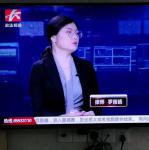发布文号:
(Adopted on May 9, 1997 at the 25th session of the eighth National People's Congress standing committee, promulgated by President Jiang Zemin on May 9, 1997)
Table of Contents
Chapter I.
General Provisions
Chapter II.
Supervisory Organs and Supervisory Personnel
Chapter III.
Supervisory Organs' Duties
Chapter IV.
Supervisory Organs' Jurisdiction
Chapter V.
Supervisory Procedures
Chapter VI.
Legal Liabilities
Chapter VII.
Supplementary Provisions
Chapter I. General Provisions
Article 1.
This law is formulated in line with the constitution to enhance supervisory work, ensure the smooth implementation of government decrees, maintain administrative discipline, promote clean and honest administration building, improve administrative management, and raise administrative efficiency.
Article 2.
Supervisory organs are organs of the people's government organs which exercise supervisory functions. In line with this law, they exercise supervision over state administrative organs, government functionaries, and other personnel appointed by state administrative organs.
Article 3.
Supervisory organs exercise their functions and powers according to law, and are not subject to interference by other administrative organs, social groups, and individuals.
Article 4.
In engaging in supervisory work, supervisory organs shall adhere to the principle of seeking truth from facts, rely on evidence, stress study and investigation, and emphasize equality when applying laws and administrative discipline.
Article 5.
Supervisory work should integrate education with punishment and supervisory inspection with improvement work.
Article 6.
It is necessary to rely on the masses to carry out supervisory work. Supervisory organs should set up a report system. Citizens have the right to report on or file charges against acts of law-breaking and of dereliction of duty by any state administrative organs, government functionaries and other personnel appointed by state administrative organs to supervisory organs.
Chapter II. Supervisory Organs and Supervisory Personnel
Article 7.
State Council supervisory organs have jurisdiction over the nation's supervisory work.
Various levels of local people's government supervisory organs at county level or higher are responsible for supervision work in their administrative regions. They are held responsible by the same level of the people's government and by superior supervisory organs and they report work to them. Superior supervisory organs take the main lead in supervisory operation.
Article 8.
Various levels of supervisory organs under the people's government at county level or higher may, after approval by the same level of people's government, set up supervisory organizations at government departments or dispatch supervisory personnel to government departments according to work requirements.
Supervisory organizations or supervisory personnel set up or dispatched by supervisory organs are held responsible by and report to supervisory organs which set up the supervisory organizations and dispatch the personnel.
Article 9.
Supervisory personnel should abide by law and discipline, be devoted to their duties, enforce law with impartiality, be upright in performing their official duties, and maintain confidentiality.
Article 10.
Supervisory personnel should be familiar with supervisory operation and possess a corresponding educational level and professional knowledge.
Article 11.
Approval of superior supervisory organs is needed before proposing and deciding on the appointment and removal of chiefs and deputy chiefs of supervisory organs under various levels of people's government at county level or higher.
Article 12.
Supervisory organs practice a supervisory system over supervisory personnel in performing duties and in abiding by discipline.
Article 13.
Supervisory personnel perform official duties according to law and are protected by law. Organizations and individuals shall not obstruct the lawful performance of official duties by supervisory personnel; they are forbidden to retaliate against supervisory personnel.
Article 14.
Supervisory personnel should avoid handling supervisory matters which conflict with their interests or the interests of their relatives.
Chapter III. Responsibilities of Supervisory Organs
Article 15.
State Council supervisory organs exercise supervision over the following organs and personnel:
(1) The State Council's various departments and its government functionaries;
(2) Other personnel appointed by the State Council and by the State Council's various departments;
(3) Provincial, autonomous regional, and municipal people's governments and their leading personnel.
Article 16.
People's government supervisory organs at county level or higher exercise supervision over the following organs and personnel:
(1) The same level of various people's government departments and their government functionaries;
(2) The same level of people's government and other personnel appointed by same level of various departments under the people's government;
(3) The lower level of people's governments and their leading personnel.
People's government supervisory organs in counties, autonomous counties, cities without a district organization and districts directly under city administration, also exercise supervision over government functionaries of villages, ethnic villages, people's township governments under their jurisdiction as well as over other personnel appointed by villages, ethnic villages, and people's township governments.
Article 17.
Superior supervisory organs may handle supervisory matters which are under the jurisdiction of lower level supervisory organs; they may also handle, when necessary, supervisory matters that are within the scope of various levels of supervisory organs that are under their jurisdiction.
When disputes arise between supervisory organs over the scope of jurisdiction, their common superior supervisory organs shall decide the dispute.
Article 18.
To exercise supervisory functions, supervisory organs fulfil the following functions:
(1) Check on problems in the state administrative organs' adherence to and enforcement of laws, regulations, and decisions and orders of the people's government;
(2) Accept the handling of charges and reports leveled against acts of administrative discipline violations by state administrative organs, government functionaries, and by other personnel appointed by state administrative organs;
(3) Investigate and handle acts of administrative discipline violations by state administrative organs, government functionaries, and by other personnel appointed by state administrative organs;
(4) Accept appeals against decisions of administrative punishments imposed by competent administrative organs submitted by government functionaries and other personnel appointed by state administrative organs as well as other appeals handled by supervisory organs as stipulated by laws and administrative rules;
(5) Fulfil other functions required of supervisory organs as stipulated by laws and administrative rules.
Chapter IV. Supervisory Organs’ Jurisdiction
Article 19.
Supervisory organs have the right to adopt the following measures to fulfil their functions:
(1) Request departments and personnel under supervision to provide documents, materials, financial accounts, and other materials related to the suspension of matters for inspection or for duplication purposes;
(2) Request departments and personnel under supervision to offer explanations related to supervisory matters;
(3) Order departments and personnel under supervision to cease acts that violate laws, regulations, and breach of administrative discipline.
Article 20.
Supervisory organs, when investigating acts that violate administrative discipline, may take the following measures in line with the actual situation and requirements:
(1) Temporarily remove and seal for safekeeping documents, materials, financial accounts, and other relevant materials that could prove acts of discipline violation;
(2) Order units and personnel under investigation not to sell and transfer related fund and articles during investigation period;
(3) Order personnel under investigation for suspicion of violating administrative disciplines to make explanations of the matters under investigation at an appointed time and place; however, personnel under investigation shall not be detained in any manner;
(4) Suggest to relevant organs to temporarily bar those who are suspected of having seriously breached administrative discipline from performing official duties.
Article 21.
When investigating acts of administrative discipline violation involving corruption, bribery, and fund diversion, supervisory organs may, upon approval of leading personnel of supervisory organs at county level or higher, check into bank deposits of those units and personnel in question; when necessary, supervisory organs may request people's courts to take preventive measures to freeze, according to law, deposits of suspected personnel at banks or at other financial institutions.
Article 22.
When handling cases involving breach of administrative discipline, supervisory organs may ask public security, auditing, taxation, customs, industry and trade administrative management organs, for assistance
Article 23.
Supervisory organs may recommend supervision, if they find one of the following circumstances in the results of inspection and investigation:
(1) Refusal to enforce laws and regulations, or violation of laws and regulations as well as decisions and orders of people's governments, which should be corrected;
(2) Decisions, orders, and directions issued by departments of the people's governments at their corresponding levels and people's governments at lower levels, which should be corrected or withdrawn for contradicting laws, regulations, or state policies;
(3) Infringements upon state and collective interests and legitimate interests of citizens that require remedial measures;
(4) Employment, appointments, removals, awards, and punishments which are obviously inappropriate and should be corrected;
(5) An action that should receive administrative punishment according to relevant laws and regulations;
(6) Other circumstances in which supervision should be recommended.
Article 24.
Supervisory organs may make a decision or recommendation for supervision, if they find out one of the following circumstances in the results of inspection and investigation:
(1) Violation of administrative discipline which should be given the administrative punishment of warning, record of a demerit, record of a major demerit, demotion, dismissal from post, or discharge from employment according to laws;
(2) Money and goods obtained through the violation of administrative discipline, which should be confiscated, recovered, or ordered to return or compensate according to laws.
Where a decision or recommendation of supervision is made according to the first circumstance of the previous paragraph, the state stipulations concerning the limits of one's authority in personnel management and handling procedure should be observed.
Article 25.
Departments and personnel concerned should execute the decisions of supervision made by supervisory organs according to law. Departments concerned, if they do not have any justifiable reason, should accept the recommendations of supervision made by supervisory organs according to laws.
Article 26.
Supervisory organs have the rights to conduct an investigation on units and individuals involved in the supervised matters.
Article 27.
Leading personnel of a supervisory organ may attend relevant meetings of people's government at the corresponding level as observers, whereas supervisory personnel may attend meetings of departments being supervised concerning the supervised matters.
Article 28.
Supervisory organs may award meritorious persons who file charges or expose major violations of laws and discipline according to relevant stipulations.
Chapter V. The Procedures of Supervision
Article 29.
Supervisory organs conduct an inspection according to the following procedure:
(1) Set up a case for the matter that needs to be inspected;
(2) Draft an inspection scheme and organize its implementation;
(3) Submit a report on the inspection to people's governments at the corresponding levels or the supervisory organs at a higher level;
(4) Make a decision or recommendation of supervision according to the results of the inspection.
The set-up of cases on important matters for inspection should be reported to people's governments at the corresponding levels and supervisory organs at the higher level for the record.
Article 30.
Supervisory organs conduct investigations of and handle the behavior in violation of administrative discipline according to the following procedures:
(1) Conduct a preliminary examination of the matter that requires investigation and action; set up a case for the matter if it is believed there is an violation of administrative discipline and there is a need to determine the administrative disciplinary responsibility ;
(2) Organize and conduct an investigation to collect relevant evidence;
(3) Examine the evidence proving the violation of administrative discipline, which deserves administrative punishments or other actions;
(4) Make a decision or recommendation of supervision.
The set-up of an important and complicated case should be reported to people's governments at the corresponding levels and supervisory organs at the higher level for the record.
Article 31.
Where a supervisory organ determines that the fact of a violation of administrative discipline does not exist in an established case after investigation, or there is no need to determine the administrative disciplinary responsibility, it should withdraw the case and inform the unit being investigated and its higher department, or the individuals being investigated and their units, of the withdrawal.
The withdrawal of important and complicated cases should be reported to people's governments at the corresponding levels and supervisory organs at the higher level for the record
Article 32.
A case which is placed on file for investigation by supervisory organizations should be concluded in six months starting from the date the case was placed on file. Under special circumstances, if the case on file needs more time for investigation, the course of investigation and handling may be extended for a maximum period of one year and the extension of investigation and handing should be reported to the higher supervisory organization for record keeping.
Article 33.
In the course of inspection and investigation, the supervisory organization should hear statements and arguments by the unit or person under investigation.
Article 34.
When a supervisory organization makes important supervisory decision or puts forward important supervisory recommendations, it should be approved by the people's government at the same level and supervisory organization at the higher level. The important supervisory decision and important supervisory recommendations made by supervisory organizations under the State Council should be approved by the State Council.
Article 35.
The decisions and recommendations made by the supervisory organization should be sent to related units or personnel in written form.
Article 36.
After receiving a written notice on supervisory decisions or recommendations. the concerned units should inform the supervisory organization within 30 days on the situation of implementing the supervisory decisions or accepting the supervisory recommendations.
Article 37.
When government functionaries or staff members appointed by state administrative organs do not concur with the administrative punishment made by the organization in charge of personnel action, they may make appeals to the supervisory organization within 30 days from receiving the administrative decision. The supervisory organization should re-examine the decision with 30 days after receiving such a request. If the government functionaries or staff members appointed by the state administrative organs still not do concur with the decision, they may request the higher supervisory organization to further examine the case within 30 days after receiving the results of the re-examination. The higher supervisory organizations should make a decision on the final examination within 60 days after receiving the request.
During the period of re-examination and final examination, the implementation of the original decision will not be stayed.
Article 38.
When handling appeals by units or individuals who do not agree with the administrative punishment made by their administrative units, the supervisory organizations may recommend changes or cancellation of the original decisions if the original decisions are found to be inappropriate after reinvestigation. The supervisory organization may also, within their powers, directly make a decision on changing or canceling the administrative decisions
Other appeal cases prescribed by the law and administrative rules shall be handled in accordance with related laws and administrative regulations
Article 39.
Those who do not concur with the decision of a supervisory organization, may request the supervisory organization to re-examine the case with 30 days after receiving the notice of decision. The supervisory organization should examine the case within 30 days after receiving such requests and make a new decision. Those who do not concur with the decision of the re-examination may ask the higher supervisory organization to investigate and decide on the case within 30 days after receiving the decision of the re-examination. The higher supervisory organization should make its examination decision within 60 days after receiving the appeal for reinvestigation and decision.
During the period of re-examination and reinvestigation, the implementation of the original decision will be not stayed.
Article 40.
If the higher supervisory organization considers the decision of its lower supervisory organization inappropriate, it may order the lower supervisory organization to change or cancel the decision, and if necessary the higher supervisory organization may directly make a decision changing or canceling the decision.
Article 41.
The decisions made by the higher supervisory organization after re-examination and the decisions of the State Council's supervisory department made after re-examination or retrial shall be final.
Article 42.
Where there is disagreement over a recommendation of supervision, the party concerned may raise it with the supervisory organ that has made the recommendation within 30 days of receipt of the recommendation; the supervisory organ shall make a reply within 30 days of receipt of the disagreement. If the party concerned still disagrees with the reply, the supervisory organ shall submit it to the people's government at the corresponding level or the supervisory organ at the next higher level for a ruling.
Article 43.
Where a supervisory organ finds the matter under its investigation falls outside its jurisdiction, it shall refer it to units that have jurisdiction over it. Where crime is involved, the matter shall be referred to judicial authorities for investigation in accordance with law.
The unit or organ that has accepted the matter shall notify the supervisory organ of how the matter has been handled.
Chapter VI. Legal Liabilities
Article 44.
A person under supervision who has been found to have committed one of the following acts shall be instructed to make amendments by competent authorities or the supervisory organ; where the violator is a department, it shall be criticized in a circular. The person in charge and other personnel directly responsible shall be given administrative punishment in accordance with law:
(1) Attempt to cover up the truth, present false evidence, or to hide, remove, alter, and destroy evidence;
(2) Intentional delay or refusal to produce documents relevant to the matter under supervision;
(3) Selling off or transferring property under suspicion while investigation is being conducted;
(4) Refusal to offer an explanation on the questions raised by the supervisory organ;
(5) Refusal to implement the decision of supervision or to adopt the recommendation of supervision without a justifiable reason; and
(6) Other gross violations of provisions of this law.
Article 45.
Whoever is found to have retaliated against the petitioner, complainant, accuser, or supervisory personnel shall be punished with administrative sanctions in accordance with law. Criminal liability shall be affixed through the process of law if there is breach of the criminal code.
Article 46.
Where the supervisory personnel are found to have abused powers or bend the law for personal gains or to be guilty of dereliction or leaking classified information, they should be punished with administrative sanctions; criminal liability shall be affixed through the process of law if there is breach of the criminal code.
Article 47.
Where there is infringement upon and damage to the legitimate interests of citizens, legal persons, or other organizations as a result of the supervisory organ or personnel illegally exercising their powers, compensations shall be made in accordance with law.
Chapter VII. Supplementary Provisions
Article 48.
This law shall go into effect upon the day of its promulgation. The "Regulations on Administrative Supervision of the People's Republic of China" promulgated by the State Council on February 9, 1990 shall be annulled on the same day.










